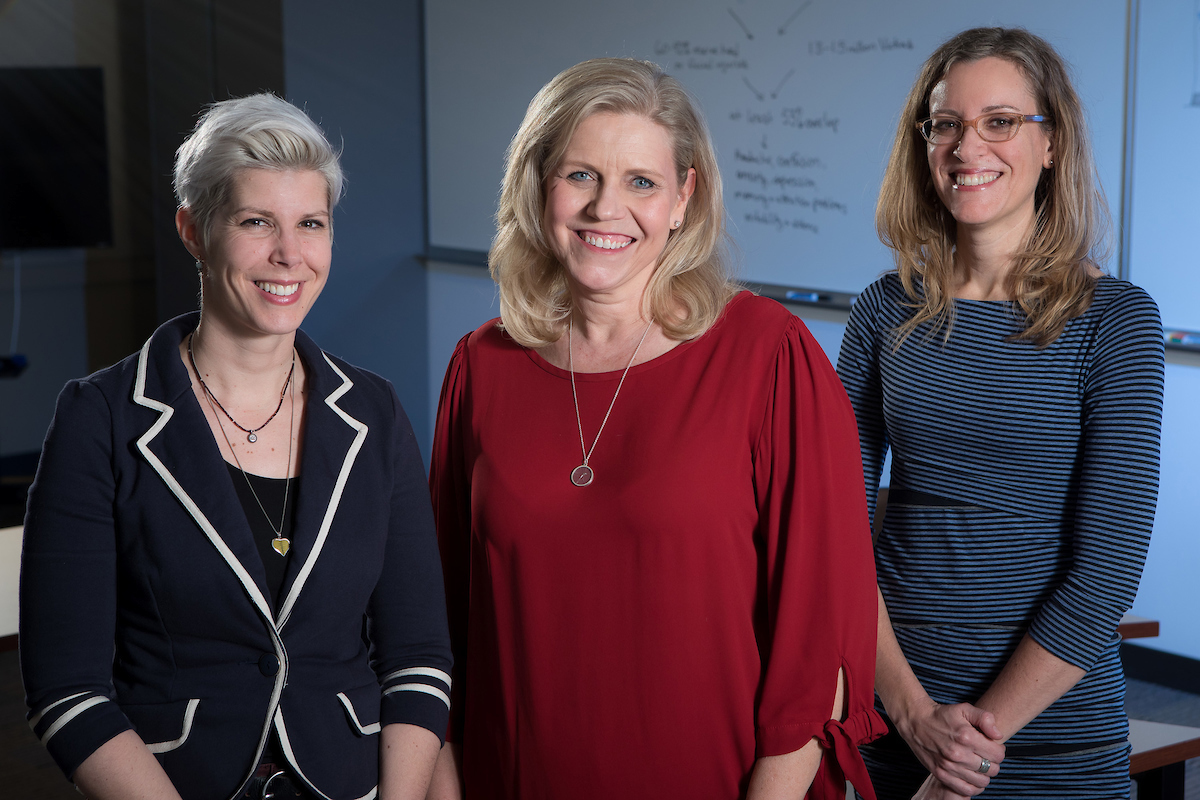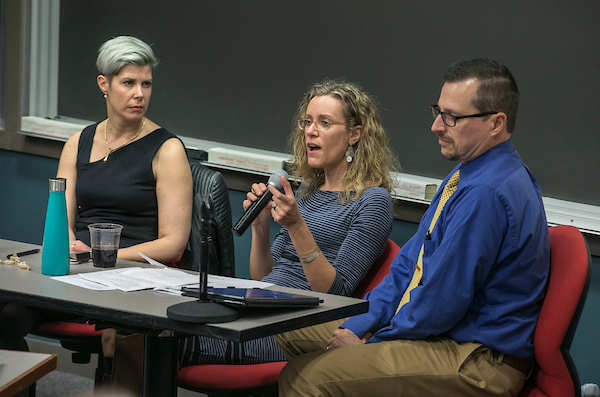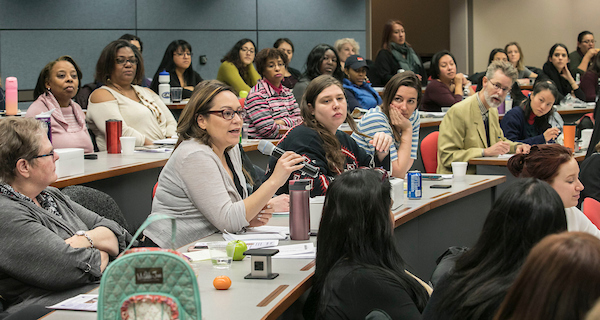 From left to right: Faculty Doris Rusch, Dorothy Kozlowski and Sonya Crabtree-Nelson earned an Academic Initiatives Program grant to raise awareness in Chicago about the intersection of domestic violence and traumatic brain injury. (DePaul University/Jeff Carrion)
From left to right: Faculty Doris Rusch, Dorothy Kozlowski and Sonya Crabtree-Nelson earned an Academic Initiatives Program grant to raise awareness in Chicago about the intersection of domestic violence and traumatic brain injury. (DePaul University/Jeff Carrion)
Loss of memory. Trouble concentrating. Unstable mood.
More and more, professional football players have spoken up about suffering these symptoms after sustaining repeated concussions. Neuroscientist Dorothy Kozlowski at DePaul University has been researching traumatic brain injury for years and has led local efforts to help kids protect their brains while playing sports. So when she heard a colleague mention that he does similar work with victims of domestic violence in Arizona, "bells went off" for Kozlowski.
"Survivors themselves don't equate some of the issues they're having with memory or emotionality with the fact that they probably suffered traumatic brain injury in some way," says Kozlowski, a Vincent de Paul Professor of Biological Sciences and director of DePaul's neuroscience program, adding, "Individuals who suffer from domestic violence also have a high propensity for concussions."
 Social work faculty member Sonya Crabtree-Nelson speaks during a panel discussion at the conference, along with Dorish Rusch from the College of Computing and Digital Media, and Peter DeYoung, emergency department manager at Christus Santa Rosa Hospital in San Antonio. (DePaul University/Jamie Moncrief)
Social work faculty member Sonya Crabtree-Nelson speaks during a panel discussion at the conference, along with Dorish Rusch from the College of Computing and Digital Media, and Peter DeYoung, emergency department manager at Christus Santa Rosa Hospital in San Antonio. (DePaul University/Jamie Moncrief)
To take action, Kozlowski teamed up with faculty members Sonya Crabtree-Nelson in the Department of Social Work and game designer Doris Rusch in the College of Computing and Digital Media. They earned an Academic Initiatives Program grant from DePaul to raise awareness in Chicago about the intersection of traumatic brain injury and domestic violence. In February, they organized a conference that drew some 120 people into packed sessions, including local police, health care providers, social workers and attorneys.
"It was really a diverse group of individuals who care about victims of interpersonal violence," Kozlowski says.
One of the keynote speakers was Jonathan Lifshitz from the University of Arizona College of Medicine, who described how the Phoenix area has implemented screening and care for traumatic brain injury across law enforcement, health care and domestic violence agencies. The big takeaway? Start small, says Crabtree-Nelson, who worked for many years as a clinical social worker in Chicago.
"Usually we're paying more attention to survivors' immediate needs like getting to safety, finding housing and counseling," says Crabtree-Nelson, an assistant professor of social work. She said Lifshitz's presentation energized the group in Chicago to think about ways to incorporate screening for traumatic brain injury at the local level. The Chicago Metropolitan Battered Women's Network is a community partner for the project, and executive director Kathy Doherty spoke on the panel discussion about ways to move the work forward in Chicago.
 Faculty organized a February conference on traumatic brain injury and domestic violence, and some 120 people attended, including social workers, law enforcement and local health care workers. (DePaul University/Jamie Moncrief)
Faculty organized a February conference on traumatic brain injury and domestic violence, and some 120 people attended, including social workers, law enforcement and local health care workers. (DePaul University/Jamie Moncrief)
There was also strong interest at the conference in Rusch's work as a game designer. An associate professor in the College of Computing and Digital Media, Rusch leads the Deep Games Lab and came to the project with an open mind. She started by interviewing survivors of abusive relationships at a local domestic violence organization, Between Friends. She heard what gave them strength - like holding onto a child's baby sock during courtroom proceedings - as well as how it felt to be trapped in an abusive relationship. "I have some personal experiences with this, and I know it can happen to anyone," Rusch says.
She presented at the conference about her work to create games that build empathy for people suffering from mental illness and other health issues. This spring, Rusch and her students will build a game that mirrors the experiences that survivors shared. "The game will be about educating young adults about healthy relationships, as well as the components that lead to an abusive relationship," Rusch says.
She also hopes that the game can help remove some of the stigma that survivors experience by showing family, friends and caregivers how it feels to be trapped in an abusive relationship. "Games can help convey complex experiences," Rusch says. "They enable understanding in a powerful way that can create dialogue and discourse," she adds.
Moving forward from the conference, the DePaul researchers have identified a strong group of local collaborators who will decide what the next steps should be to address the issue. "We're just starting this in Chicago," Kozlowski says. "We're trying to educate those who work with survivors, but in the future we're also hoping to reach those who've suffered abuse themselves ... to let them know that some of their symptoms could be caused by traumatic brain injury," Kozlowski says.